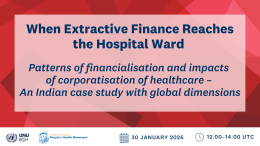Haiti has been in an ongoing and worsening crisis situation since 2018, exacerbated by the 2021 assassination of late President Jovenel Moise, successive disaster events, and the resurgence of cholera. The precariousness of daily life for ordinary Haitians was made explicit in a recent report by the United Nations Human Rights Office of the High Commissioner – prompting calls for the UN to mobilize support and protect at-risk communities. Amid widespread poverty and hunger, Haitians remain highly exposed to the risks of kidnappings, systemic violence, and sexual and criminal exploitation.
Many poor and marginalized communities are especially vulnerable to modern slavery, including trafficking for exploitation within and outside of the country. Haiti is mentioned 126 times in the 2022 Trafficking in Persons reportpublished by the United States, indicating that the trafficking of Haitians into forced labour and other forms of modern slavery is a significant phenomenon. Exploitation within the country – especially of children, internally displaced persons, and returnees – also remains a high risk. Following reports that up to 60,000 Haitians were repatriated from the Dominican Republic alone last year, UNHCR issued a call for all States to refrain from enforced returns to Haiti in the midst of this crisis.
Mobilizing the financial sector to act
The financial sector has a key role to play in anti-trafficking efforts in conflict and crisis settings. A December 2022 call to action by the Inter-Agency Coordination Group Against Trafficking in Persons (ICAT) – ‘Global Humanitarian Crises and Conflicts Increase Human Trafficking Concerns’ – outlines the importance of engaging the financial sector in identifying and addressing slavery and trafficking and reducing financial exclusion, a risk multiplier for experiencing exploitation. Promoting financial inclusion, creating responsible and sustainable financial products and services that are useful and affordable to those most at at risk, is widely perceived as a key form of defence against the threat of modern slavery.
Unfortunately, Haiti’s financial sector faces constraints that limit its capacity to provide financial inclusion. Haiti was placed under ‘Increased Monitoring’ (‘Grey Listed’) in 2021 by the Financial Action Task Force (FATF) because of “deficiencies in their regimes to counter money laundering, terrorist financing, and proliferation financing,” and financial exclusion has been identified as one of the possible unintended consequences of implementing the FATF recommendations. De-risking and limited access to financial services, combined with rising poverty, places the Haitian population at high risk of modern slavery, both within and outside of Haiti.
Exploring solutions to address the threat of modern slavery
In order to provide an initial assessment of the financial needs of Haiti’s most marginalised and their intersecting vulnerabilities to slavery and human trafficking – particularly in the context of the increasingly perilous migration journeys undertaken by Haitians within the Americas – UNU-CPR’s Finance Against Slavery and Trafficking (FAST) initiative undertook an exploratory rapid study with Interuniversity Institute for Research and Development (INURED), a Haiti-based research institute with a track record for delivering high quality research on migration.
‘Financial Needs and Vulnerabilities to Modern Slavery and Human Trafficking for Haitian Migrants’ provides preliminary insights into financial inclusion as a protective factor and the challenges and opportunities that are unique to the Haitian context. It confirms that a lack of money and access to financial services are the main drivers of vulnerability to exploitation, particularly for those living in rural areas. The study also identified community-created financial services as assets that serve as protective factors for underserved populations.
The report includes four key recommendations that the the financial sector and international community should adopt to reduce vulnerability to modern slavery:
1. Support collaborative endeavours to offer diverse formal financial services to underserved populations in Haiti. The withdrawal of International Finance Institutions at this time would have a negative impact on the security of Haitian people, especially those most vulnerable to modern slavery. The finance sector should therefore initiate cross-sectoral collaborations between Haitian banks and microfinance initiatives, mobile network operators and FinTech companies to provide services to underserved populations.
2. Explore how to safeguard and enhance informal financial services in Haiti (for example solidarity mutuals, cooperatives and sousous). Rising organized crime could lead to situations of debt bondage or exploitation for those reliant on informal financial services. Financial actors are encouraged to protect, nurture, and scale up these financial services which communities have largely created for themselves.
3. Prioritize those most vulnerable to experiencing modern slavery (especially youth and women/girls) within financial inclusion strategies and economic empowerment activities, during and post-crisis. Financial sector, government, and multilateral organizations must play a critical role in this regard.
4. Monitor for unintended consequences such as increased or sustained financial exclusion and other vulnerabilities to modern slavery during and post the current UN targeted sanction regime. The report proposes that the UN Sanctions Regime Panel of Experts would be best placed to monitor unintended consequences, but this would also require improving national and regional data collection, particularly from Civil Society Organizations, on the nature and scale of modern slavery risks for different demographic groups in Haiti. Public–Private Partnerships with financial sector integration (including investors) should also simultaneously be developed to improve practices and policies for identifying, reducing, addressing, and preventing ongoing modern slavery risks in Haiti.
Haiti faces a precarious future. But vulnerabilities to modern slavery can be substantially reduced if the financial sector and international community play a constructive role and navigate the humanitarian crisis carefully to protect and extend financial inclusion to the poorest and most marginalized.
Suggested citation: Leona Vaughn, Louis Herns Marcelin and Toni Cela., "Financial Inclusion is Key to Reducing Haiti’s Vulnerability to Modern Slavery," UNU-CPR (blog), 2023-07-28, 2023, https://unu.edu/cpr/blog-post/financial-inclusion-key-reducing-haitis-vulnerability-modern-slavery.



